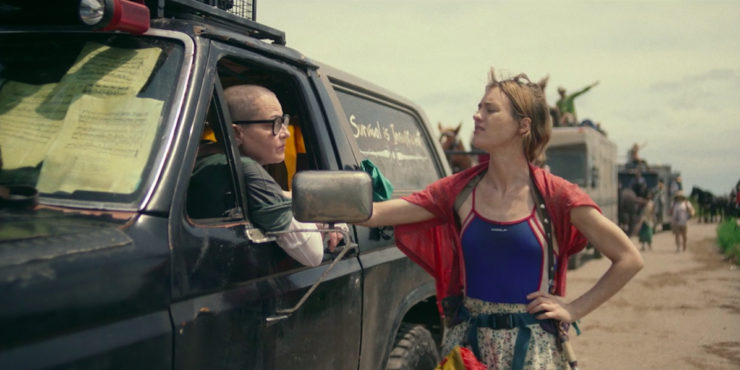The best moment in the first three episodes of HBO Max’s Station Eleven comes in episode two, “A Hawk from a Handsaw,” when one of the Traveling Symphony’s adoring fans follows their caravan in order to audition yet again to join the hybrid music/Shakespeare troupe. Except, he hasn’t prepared a monologue from the Bard. Yet they let him go ahead anyway with a rousing rendition of President Thomas J. Whitmore’s epic speech from Independence Day—but what comes out of his mouth is not his voice but Bill Pullman’s, and that movie’s sweeping orchestration that sounds just this side of cheesy. No surprise, he brings the fucking house down.
Now, there is no actual house—this takes place on the Wheel, the road the Symphony retraces each year since the flu that ended the world—and the post-electric future makes it impossible to actually lip-sync to one’s favorite movie speeches. But that’s how it sounds to the aspiring actor’s audience, and to us viewers. This is a future powered by sheer imagination, which perfectly sums up the magic of this sharp-edged but hopeful adaptation of Emily St. John Mandel’s 2014 pandemic novel.
[Some spoilers for the first three episodes of Station Eleven.]
Despite its post-end-of-the-world premise, the series has less in common with fellow recent adaptation Y: The Last Man and more with 2019’s Watchmen: It’s a show that delights in its own mythology, both diegetically (the aforementioned monologue, as well as the Symphony’s annual performance of Hamlet) and non-diegetically (its inventive takes on the source material itself). In the hands of creator Patrick Somerville (Made for Love, The Leftovers) and director Hiro Murai (Barry, Childish Gambino: This Is America), the adaptation resembles a reassembled puzzle—with them being the ones who cut up the pieces in the first place, as they clearly realized that in order for it to come together so well they had to break it apart first.
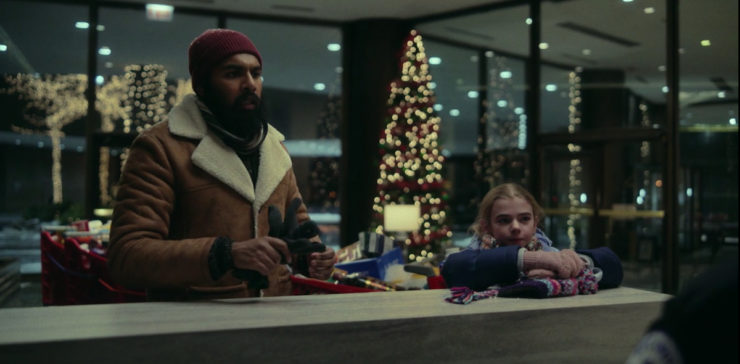
It’s fitting, then, that these three episodes represent a grab bag within the show’s own narrative timeline. “Wheel of Fire” is primarily about the final weeks before the night the flu hits, following and establishing its ensemble including Arthur Leander (Gael García Bernal), who collapses onstage in the middle of King Lear the night the world ends; Jeevan Chaudhary (Himesh Patel), a stranger who runs up to the stage trying to help; and precocious child actor Kirsten Raymonde (Matilda Lawlor), who worships Arthur as much as she does the craft itself. “Hawk” establishes the present of Year 20, a.k.a. 2040, in which an adult Kirsten (Mackenzie Davis) both delights in the Traveling Symphony’s life-giving art and fiercely protects her makeshift family from suspicious interlopers. And “Hurricane” hops around in time like someone telling a story, flashing forward only to backtrack to recall a key detail; but all grounded by Miranda Carroll (Danielle Deadwyler), Arthur’s ex-partner and creator of the eponymous self-published graphic novel Station Eleven, which will become Kirsten’s entire canon.
And that’s not even counting all of the ancillary characters, like Arthur’s old acting buddy Clark (David Wilmot), his actress wife Elizabeth (Caitlin FitzGerald); the Traveling Symphony’s quietly brilliant Conductor (Lori Petty) and Alex (Philippine Velge), a teenager who hangs on Kirsten’s every hazy memory of the before times; and Enrico Colantoni as Brian, the head of the intriguing Museum of Civilization. Even without social media—or perhaps despite the cloud’s sudden rupture—the future is still studded with constellations of relationships that interact with one another over the course of twenty years.
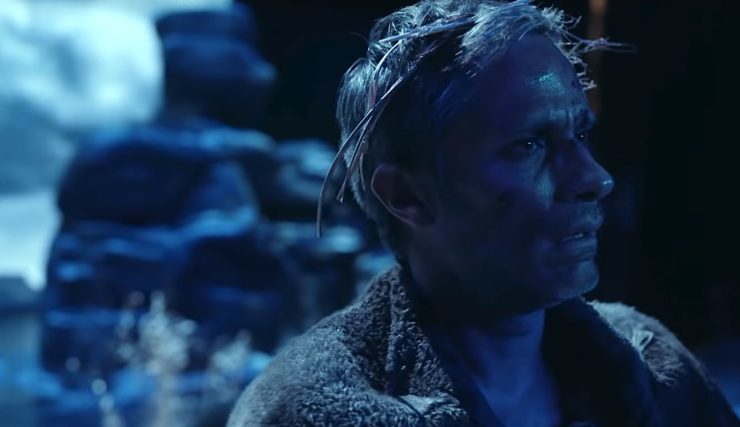
A lot of “Wheel” will cut perhaps too close to the bone for those who had similar experiences clearing out supermarkets and self-isolating at home in the early days and weeks of covid. But the pilot accounts for this discomfort by establishing narrative distance in camera-shutter-quick jumps to Year 20: Jeevan having a panic attack on Chicago’s El train cuts immediately to a shot of that same platform wreathed in plant overgrowth, some of which has literally stopped the train in its tracks. These brief, wordless flash-forwards seem to say That was the end of one era, this is the start of another.
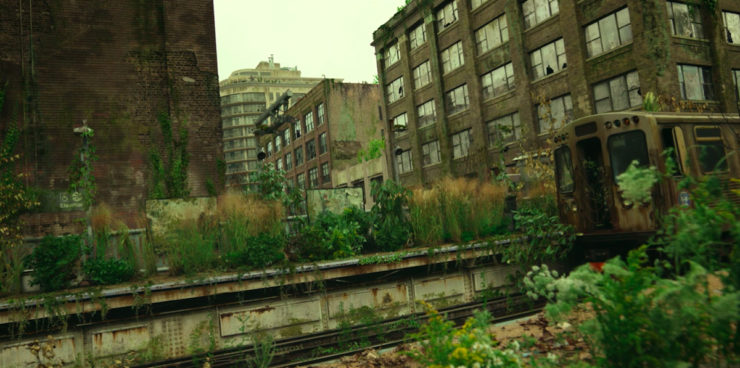
“Hurricane” is incredibly reminiscent of Watchmen’s “A God Walks into Abar,” which retroactively explains Dr. Manhattan’s existence in the reboot all along via his unstuck-in-time love story with the series’ protagonist Angela. But whereas that episode was the show’s penultimate offering, “Hurricane” comes so early on (a third of the way through) that it feels almost too ambitious a choice, especially for viewers new to the story. Condensing basically all of Miranda’s plotline from the book into an hour might lose some people who don’t know the book and may fail to entirely grasp the significance of each time jump. Yet its ending note, in which a soon-to-die Miranda wordlessly stares down her astronaut creation, promises a surreal quality to those who are touched by Station Eleven the comic. With another series, this device could be overused, but so far it seems to be a solid throughline to the future.
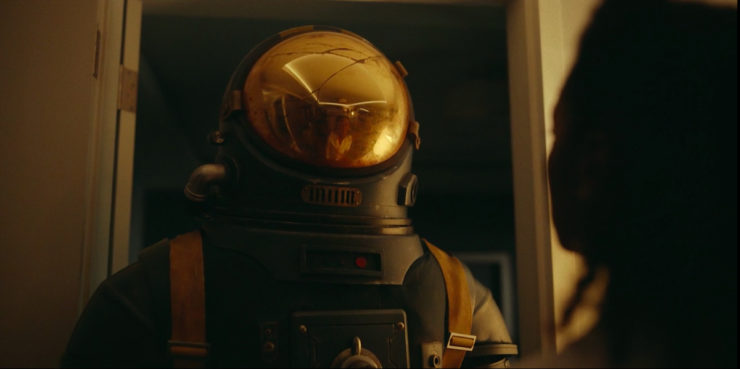
Because “Hawk” and Year 20 is where the series’ heart firmly beats. There are so many fantastic little details, like the fact that Kirsten and other Symphony members wear athleisure and swimwear as their multifunctional daily ensembles; or Kirsten’s reputation preceding her for her rendition as Hamlet. The Wheel’s ease (but never complacency) on the road is clear, which means that of course their annual passage through the settlement of St. Deborah-by-the-Water is due to get derailed.
At first it’s the revelation that her fellow Symphony performer, former lover, and dear friend Charlie has decided to put down roots for the year because of her baby’s imminent birth. It makes perfect sense, but so does Kirsten’s swift reaction to feel betrayed and lash out at Charlie for choosing a different definition of family than the one they’d had for so long. There are so many layers to the two women’s conversation, in which Charlie points out that what triggers Kirsten is abrupt transitions from one state to another, and that she doesn’t want her daughter to suffer the same associations. But it’s also a debate between two artists in which one is prioritizing the life she created over the art that has sustained them both for so long. This series is so profound in the smallest moments.
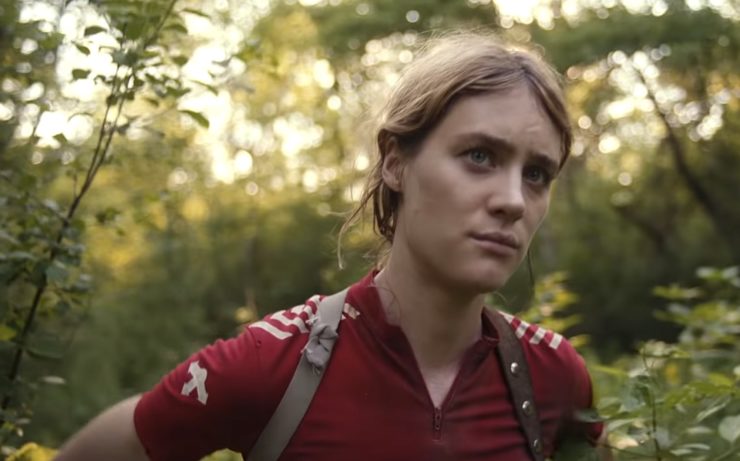
Then there’s Brian’s invitation for the Symphony to perform at the opening of the Museum of Civilization (a lovely little detail, new to the series, that makes my heart hurt), only to be rebuffed by the Conductor with her similar need for stability. And of course we can’t forget the whisperings from two new audience members about a man calling himself the Prophet, who unlike Brian is less likely to take no for an answer… but in fittingly Hamlet fashion, the messenger gets a knife to the gut courtesy of the leading lady.
This might be Davis’ best role yet, and we’ve hardly even glimpsed the full range of her steely-eyed, piano-wire-taut persona. Future episodes will no doubt flash back to show what young Kirsten endured in order to become this protective adult—or they may go the book route and block out those years, simply clicking the shutter of memory from past to present over and over, until we, too, are used to looking ahead rather than back.
Station Eleven is available on HBO Max, with new episodes released on Thursdays.
Natalie Zutter cannot wait to see Station Eleven bleed into Year 20 in future episodes. Talk post-apocalyptic art with her on Twitter!










